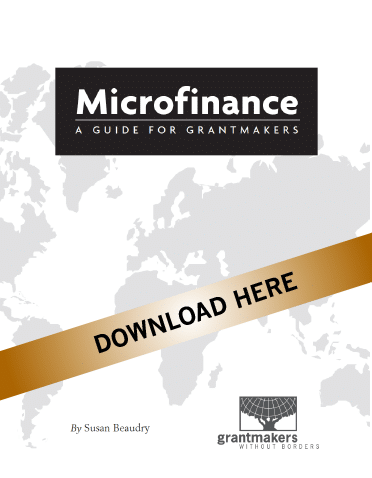Our Approach
Mission
The Goldin Institute inspires, equips and connects grassroots leaders who help their communities build on their strengths and collaborate to determine their own future.
We help communities achieve their goals through a combination of on-line and on-the-ground initiatives that promote innovative, community-driven partnerships between a wide range of stakeholders and sectors of civil society. We know that real and lasting progress towards a more just, peaceful and sustainable world requires that those closest to the issue, especially often excluded voices with the most at stake in making progress, have leadership roles in any social change movement.
To support community-driven social change, the Goldin Institute built the GATHER platform to support communities of practice who can learn from each other and collaborate across boundaries.
The GATHER Platform helps grassroots leaders and their communities:
- Build on our assets by inviting their neighbors to share their talents and activating our shared community assets. We start with what we have and focus on what’s working rather than what we lack and what’s broken.
- Commit to equity and justice to get at the root of the issues and so that people who are too often left out can take leadership roles in our future. We know that our diversity helps us to see and change the system.
- Enhance both trust and capacity recognizing that our ability to make real and sustainable progress requires us to maintain bonds that keep us going when times are tough. We balance building relationships and taking action.
- Make local and global connections by linking grassroots efforts in our global network, we provide opportunities to adapt creative solutions to local contexts. We connect and equip a global network of grassroots leaders.
Our vision and values enable bottom up strategies that add up to real change:




The Goldin Institute achieves its mission and enacts its priciples through:
Goldin Institute Events
The Goldin Institute works in cooperation with local partners around the world to host international gatherings on issues identified by members of our network. The Institute and our local partners cooperatively invite teams to participate in these global gatherings to focus on challenges related to both the global and regional dimensions of each issue, as well as developing concrete and actionable plans within and across partnering communities.
Research and Consultative Support
The Goldin Institute builds innovative global partnerships to address critical issues and design new tools and strategies on behalf of our international network. Our research services, educational opportunities and consultative support directly serves communities, grassroots organizations, international agencies and the philanthropic sector to implement innovative and sustainable programming. You can review key reports and tools in our resource library.
Goldin Institute Associates
Our projects have convened outstanding grassroots leaders, organizers and activists from around the world who lead the local and regional initiatives of the network. Consistent with our approach in building capacity in communities in which we work rather than in our home office, our staff includes a growing team of Goldin Institute Global Associates. Global Associates serve as "extension staff" and lead the facilitation of Goldin Institute programs in communities around the world.
Global Network
The Goldin Institute's Partner Network is comprised of groups from over 60 cities around the world. This network provides the foundation for the work we do. Our network of leaders, activists, community organizers, government, and NGO staff share our commitment to build grassroot partnerships for global change.
Vision and Values
Our community-driven approach is critical to developing creative and effective grassroots strategies that balance community building and social action. This approach focuses on bringing often neglected perspectives and voices to the table for creative exchanges. By linking grassroots efforts from around the world in our global network, we provide opportunities to build innovative multi-sector relationships and solutions that both adapt to particular local contexts and draw from creative solutions and approaches from around the globe.
Core Principles:
Building Multi-Sector Partnerships
We are committed to facilitating relationships that cut across different sectors of civil society including leadership from government institutions, media outlets, educational institutions, religious communities, activists, business leaders and community partners. Through these relationships, our participants can effectively work to affect social change in systemic ways.
Engaging Communities
The loci of the Institute are local communities. Many of our communities are microcosms of both change and strife that plays out across the globe. Regardless of where they are located, many communities find themselves sharing similar concerns: poverty, HIV/AIDS, community disintegration, inter-group tensions, insufficient infrastructure, corruption, and other critical issues. Our focus on building relationships and community-driven partnerships promotes the cooperative capacity to address challenges that are grounded in the experience and work of participants.
Providing Concrete Tools for Social Change
Often creative initiatives fail due to lack of institutional capacities, organizational development, connections and resources. We are committed to providing tools that can be directly applied within the daily routines of our participants. These tools focus on sharing creative solutions, new approaches, best practices, project facilitation, and effective management.
Focusing on Community Led Change
Dominant perspectives on policy and development tend to emphasize large-scale and quantitative approaches to understanding and surmounting social problems. While recognizing the value of such approaches, we create a space for qualitative individual and community-based perspectives. By focusing on methodologies that emphasize cooperative approaches to assessment, development, and policy initiatives, we promote a perspective that sees individuals and communities as active partners in defining and achieving a just and sustainable future.
Our Background
The Goldin Institute was founded by Diane Goldin and Travis Rejman in 2002 as a forum to bring together engaged grassroots leaders to form a global network for conflict resolution, poverty alleviation and environmental sustainability. You can learn more about the history of the Goldin Institute by visiting our timeline.
Annual Events
Each year we work in cooperation with a partner city to host an international gathering on issues critical to peace and sustainability. The Goldin Institute and the partner city cooperatively invite teams to participate in a week-long conference focusing on challenges related to both the global and regional dimensions, as well as developing concrete and actionable plans.
Breaking the Cycle of Violence for Child Soldiers, Cartagena, Colombia, 2007
Held in association with the Centro Mundial in Colombia, this event convened a global forum on the theme of Reintegration and Prevention: breaking the cycle of violence for ex-combatants and vulnerable youth. The forum served as a catalyst to launch a new national platform in Colombia to engage the social, civic and public sectors throughout the country in reintegrating former combatants and preventing the recruitment and use of child soldiers. View Event
Promoting Reconciliation in the Midst of Conflict, Amritsar, India, 2005
Teams focused on building trust, understanding and cooperation in high-conflict areas through innovative reconciliation efforts. Through our partnership with the Guru Nanak Nishkam Sewak Jatha and associated organizations throughout the Punjab areas in India and Pakistan, participants had the opportunity to learn from local effort towards reconciliation throughout the week. View Event
Providing Access to Safe Drinking Water, Taipei, Taiwan, 2004
Teams focused on understanding and addressing the global water crisis. Commitments to launch or enhance creative projects and initiatives engaging leaders from multiple sectors (Religion, Business, Education, Media, Science, the Arts, etc.) were made and are now being created or enhanced in cities around the world. View Event
Building Social Cohesion amidst Diversity and Migration, Manresa, Spain, 2003
Teams of grassroots leaders and activists explored the theme of building social cohesion in the midst of diversity, learning from each other and the nascent but growing movement to welcome immigrant communities in Manresa, Catalonia and Spain. View Event
Forming a Global Partner Cities Network, Chicago, USA 2002
Participants learned from the experience of Chicago's grassroots leaders and worked together to build a platform for shared learning and support through a Network of Partner Cities. View Event
Grassroots Leadership Development
Leadership for Community Driven Social Change
The Goldin Institute is partnering with Imagine Chicago, DePaul University and the Massachusetts Institute of Technology to develop a tablet-based mobile learning platform to train grassroots activists in Community Driven Social Change.
This innovative distance learning course will be built for the iPad with the necessary instructional materials and interactive capacity built in to the device as a way to overcome the digital divide that limits many leaders in our network.
Through our work we have found that communities often face similar sets of critical challenges. By linking and supporting grassroots efforts - both online and on the ground - we provide opportunities to build innovative multi-sector partnerships and solutions that adapt to particular local contexts and draw from creative approaches from around the world.
This course will offer a new and cost effective way to bring grassroots leaders together to share innovative strategies, unique insights and knowledge. The twelve week pilot course will be launched in Spring 2015 with 20 - 25 select grassroots activists who will take the course together "online".
Pilot Course Overview
- APPLICATION PROCESS Out of over 400 applications from around the world, this course will select a geographically and demographically diverse group of 20 - 25 highly motivated grassroots leaders with a demonstrated commitment to Community Based Social Change. Selected participants will need to commit to up to eight hours per week devoted to the twelve week course.
- COURSE OVERVIEW The first section of the course will offer a basic tutorial on using the iPad and course navigation, an introduction to the Goldin Institute, an overview of the course and its primary goals. Using audio-visual resources and robust interactive capacities, this section will offer participants opportunities to get to know and engage with their new peers and colleagues.
- COMMUNITY DRIVEN SOCIAL CHANGE Through readings, recorded interviews, case studies and interactive exercises, this module will introduce participants to the theory and practice Community Driven Social Change. As opposed to traditional organizing and mobilizing initiatives, this approach builds broad-based support and engagement towards goals set by the community.
- GLOBAL ASSOCIATE APPLICATION In addition to course evaluation and reflective sessions, this final section will offer participants an opportunity to apply to join the Goldin Institute's team as a Global Associate staff member. Successful applicants will be provided the financial, material and consultative support need to utilize the tools learned through the course in their own communities.
- GLOBAL NETWORK In addition to the selected Global Associate-led projects that result from the course, the Goldin Institute will provide continuous consultative support to the growing alumni network. Alumni and their partner organizations with innovative approaches adn expertise will help inform and create a growing body of courses in service to grassroots leadership development and community-driven social change.
Preview of exclusive video content from the course:
Download the overview to learn more.
Join the Fight to End Gender-Based Violence in Haiti
Executive Summary
Since the January 12, 2010 earthquake in Haiti, women and girls living in the internally displaced persons camps face alarming rates of rape and other forms of gender-based violence. In many camps, the rate of gender-based violence has exploded to three times pre-Earthquake levels.
Along with our Global Associate Malya Villard-Appolon, we have continued to partner with the organization she co-founded, KOFAVIV, as well as the Bureau des Avocats Internationaux (BAI), the Institute for Justice and Democracy in Haiti (IJDH) and its network of partners throughout Haiti to pioneer and support a women-led, community-based pilot security platform in one representative displacement camp. This project builds on the strategy developed and implemented by KOFAVIV, the Goldin Institute's experience in creating grassroots partnerships for social change and the BAI / IJDH's capacity for legal advocacy in Haiti.
Working with leaders in other sectors of Haitian society, including the police, MINUSTAH, the Bureau des Avocats Internationaux and medical providers, this program has integrated protection, awareness, legal advocacy, healthcare, public awareness and grassroots women's leadership to fight against the scourge of violence against women and girls.
{loadposition haitislideshow}
Through this effective project, the reported incidents of rape in the Place Petion camp have been brought to zero since March 2011. Beyond this immediate reduction in rape, the security team has made significant progress in identifying and eliminating domestic abuse through trainings, interventions and public awareness.
In addition to the immediate impact of improved security in the Place Petion camp, this project has made visible the efficacy of direct partnership with grassroots women's groups who have largely been cut out of the rebuilding process in post-earthquake Haiti.
We are inspired to build on this successful model and our work has been ongoing. While the circumstances of continued displacement of the camps by the Government of Haiti has made long-term planning difficult, we are proud of the accomplishments made since 2012:
- We were able to drastically reduce violence against women and improve the sense of security in the Place Petion Camp up until its date of closure in 2013.
- We expanded the initial project into five additional camps in partnership with KOFAVIV by pairing trained male security team members from Place Petion with women agents already active in the targeted camps.
- We assisted KOFAVIV in documenting the project to aid in replicability to other sites and enabled successful fundraising for the project.
We hope you will join us in promoting women's leadership in the fight to end violence against women and girls in Haiti.
Improving Microcredit from the Perspective of Borrowers
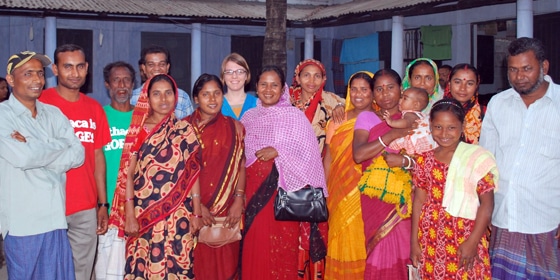
In the efforts to address poverty, the voices of those impacted by economic insecurity are too often conspicuously absent. The Goldin Institute's work builds on the experiences and perspectives of those living in poverty and designs solutions based on their knowledge, strategies and aspirations.
The current debate about the efficacy of microfinance is marked by the absence of those who have most at stake in the controversy: loan recipients. The Goldin Institute is working to lift up these voices, most often marginalized women, and restore their perspectives, insights and aspirations to the discussion.
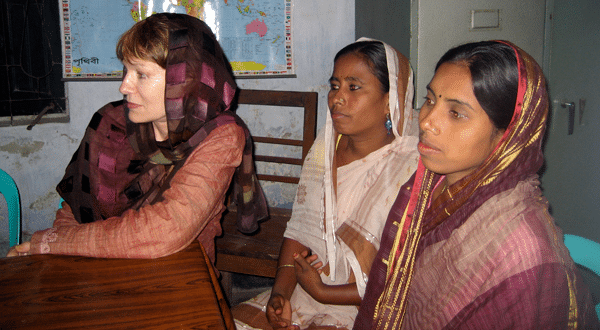
Our strategy for bringing their voices back in was simple: we decided to ask them. We adopted a strategy known as "oral testimony" which relies on extended semi-structured interviews to let participants tell their own stories in their own words, share their opinions and experiences and convey their own understandings of how development and poverty has transformed the history of their lives and villages.
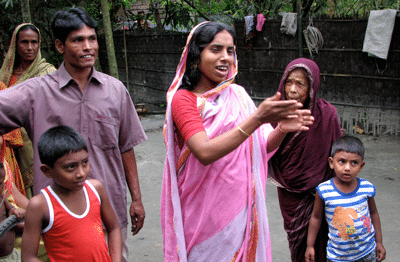
We wanted to take this approach a step further. Often oral testimony research is colored by power-dynamics between "researchers" and "subjects". Within these dynamics, answers to questions are often pre-determined by what each party expects to hear from the other. We decided to address this by inviting microcredit recipients in Arampur, a village in rural Northern Bangladesh, to interview each other about their own experiences with loans. We hoped that the content of these interviews would be shaped by mutual dialogue, rather than by top down agendas and expectations about what we, as researchers, wanted to hear.
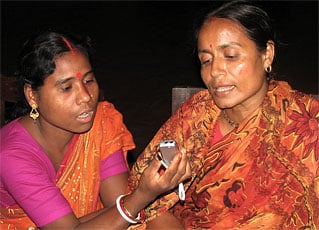
In order to do this, we trained a group of villagers in basic, qualitative research techniques and invited them to interview their peers and neighbors. The result was open-ended, conversation-style interviews, recorded using digital-audio recorders, in which the interviewees participated in directing the discussion by framing conversations through stories, life experiences and their own personal histories with microcredit lending organizations. Using this approach we heard what people had to say about microcredit on their own terms.
What are the advantages of this approach?
- The community researchers themselves were all microcredit loan recipients. They were able to give us early insight into the landscape of credit and poverty within the village. They participated in shaping and revising our research goals to better answer our questions about microcredit, as well as transforming the strategies we employed to accomplish them.
- As community members, they understood the best ways to conduct the work within the cultural context of rural Bangladesh. They understood what the best times to approach people were, how to make each interview session as comfortable for respondents as possible, how to best navigate the complexities of rural Bangladeshi household and gender power dynamics, and how to ask probing questions without crossing sensitive lines.
- Respondents were more comfortable speaking with their neighbors than they would be with a researcher from outside. Respondents did not have to explain taken for granted points. They did not have to couch their language or speaking style to be understandable to an outsider. Further, the semi and unstructured interview strategy allowed the respondents to direct the conversation, steering discussions to what they wished to talk about.
- Community researchers were better situated to explain and help us interpret stories and experiences as they were shared. They did this by recording audio field notes after every interview and by sharing their stories in daily debriefing sessions.
- Community researchers were able to elicit different kinds of responses and stories than those we could have gathered on our own. The stories shared by respondents were of a remarkably different kind than those that could or would have been shared with outside researchers. As such, the interviews collected by our fieldworkers contain different kinds of insights, stories, and critiques that shed a new light on microcredit in rural Bangladesh.
- Community researchers knew their community and therefore knew what questions to ask. They knew their respondents and were able to ask about specific incidents from their lives and histories. They could seek targeted information about their families and livelihoods. They knew the intimate details of cultural, agricultural, and political processes in the village. They were able to ask questions that pertained directly to local practices and histories.
Water Stat
-
113Safe Drinking Water Wells installed at 113 Schools and counting.
-
40KProviding Safe Drinking water to over 40,000 people in Mindanao to date.
-
100%100% of all donations to the Goldin Institute go directly to the project.
-
$5The project delivers reliable access to safe drinking water for an average of $5 per student served.
Microcredit Stats
-
12The Goldin Institute trained a team of twelve community researchers in oral testimony techniques.
-
150The research team conducted over 150 interviews with peer microcredit recipients in Arampur.
-
8This village of 1500 households now has eight microcredit banks leading to an oversaturated debt market.
-
3+The majority of households surveyed now hold three or more microcredit loans and feel entrapped by debt.


